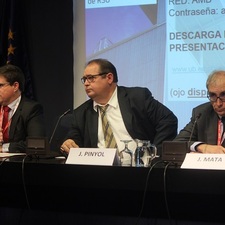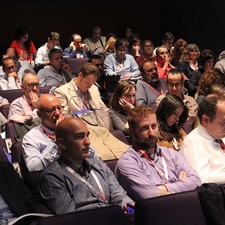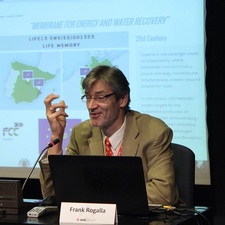At the Biometa congress, the AMB defines the future applications of organic waste
| Subject: Waste
Research in this field will lead to providing multiple uses to waste, from transforming them into fuel for cars to constructing affordable medical prostheses
On 11 and 12 May, the Biometa congress was held at the Barcelona Metropolitan Area (AMB) headquarters, where the meeting is an international reference on strategies on urban waste treatment in order to use the resulting biogas as a source of energy, among other uses. At the congress this year, with attendees ranging from metropolitan and municipal experts to companies and the university world, speeches were given that open the road to future alternative uses of organic wastes, including constructing medical prostheses or using them as automobile fuel.
Bioplastics
At present, all municipal organic waste treatment facilities either generate electricity through biomethanisation processes (to obtain biogas) or produce compost by digestion in closed stacks or tunnels. With the modification of incentives for obtaining energy from wastes and fuel taxes, current legislation complicates the sector's economic situation, which is why the AMB is seeking innovative ways to obtain products with added value, such as biochemical and bioplastic products.
These materials, manufactured from organic matter, have several advantages for the environment: they are not reliant on petroleum for their manufacture; they emit lower amounts of CO2 in the production process; and some of them are biodegradable, with a decomposition time between three and five years (compared to over 100 years for conventional plastics). After they are obtained, bioplastics have a great diversity of uses: from environmentally friendly plastic bags (which limit the production and consumption of bags that are not) to medical prostheses, with much more affordable costs than regular ones.
As explained during the Biometa congress, the AMB actively participates in research on these materials, jointly with the University of Barcelona. The aim of such research projects is to generate the information required so that in the future criteria stop considering organic matter as waste and can start considering it as a raw material.
Wastes as a renewable energy source
Also in the framework of the Biometa congress, the Methamorphosis project was presented, a European project approved within the LIFE call in 2014. This project is being promoted by FCC-Aqualia, the AMB, FCC, Gas Natural Fenosa, the Catalan Energy Institute (ICAEN) and the SEAT Technical Centre.
The purpose of this pioneering project is to introduce changes to how waste is treated, both municipal and agro-industrial, so that the production of methane is increased and so that this gas, after being enriched, could be used as a vehicle fuel, thus contributing to the reduction of GHG (greenhouse gases).
This technology will make it possible for vehicles to drive with a fuel much cleaner than hydrocarbons, with lower emission levels of particles that are damaging to the health, thus improving air quality, and without relying on oil reserves. Furthermore, the process will also let treatment plants attain high efficiency and low pollution levels, thanks to the 70% reduction in energy demand required in the process, and 80% reduction in CO2 with respect to the latest systems implemented. Thus, it is an advance in waste energy recovery and the proposed circular economy.
The effectiveness of enriched biomethane as a fuel will be proven by its use in SEAT vehicles, in a series of tests of over 120,000 km.
Bioplastics
At present, all municipal organic waste treatment facilities either generate electricity through biomethanisation processes (to obtain biogas) or produce compost by digestion in closed stacks or tunnels. With the modification of incentives for obtaining energy from wastes and fuel taxes, current legislation complicates the sector's economic situation, which is why the AMB is seeking innovative ways to obtain products with added value, such as biochemical and bioplastic products.
These materials, manufactured from organic matter, have several advantages for the environment: they are not reliant on petroleum for their manufacture; they emit lower amounts of CO2 in the production process; and some of them are biodegradable, with a decomposition time between three and five years (compared to over 100 years for conventional plastics). After they are obtained, bioplastics have a great diversity of uses: from environmentally friendly plastic bags (which limit the production and consumption of bags that are not) to medical prostheses, with much more affordable costs than regular ones.
As explained during the Biometa congress, the AMB actively participates in research on these materials, jointly with the University of Barcelona. The aim of such research projects is to generate the information required so that in the future criteria stop considering organic matter as waste and can start considering it as a raw material.
Wastes as a renewable energy source
Also in the framework of the Biometa congress, the Methamorphosis project was presented, a European project approved within the LIFE call in 2014. This project is being promoted by FCC-Aqualia, the AMB, FCC, Gas Natural Fenosa, the Catalan Energy Institute (ICAEN) and the SEAT Technical Centre.
The purpose of this pioneering project is to introduce changes to how waste is treated, both municipal and agro-industrial, so that the production of methane is increased and so that this gas, after being enriched, could be used as a vehicle fuel, thus contributing to the reduction of GHG (greenhouse gases).
This technology will make it possible for vehicles to drive with a fuel much cleaner than hydrocarbons, with lower emission levels of particles that are damaging to the health, thus improving air quality, and without relying on oil reserves. Furthermore, the process will also let treatment plants attain high efficiency and low pollution levels, thanks to the 70% reduction in energy demand required in the process, and 80% reduction in CO2 with respect to the latest systems implemented. Thus, it is an advance in waste energy recovery and the proposed circular economy.
The effectiveness of enriched biomethane as a fuel will be proven by its use in SEAT vehicles, in a series of tests of over 120,000 km.















































